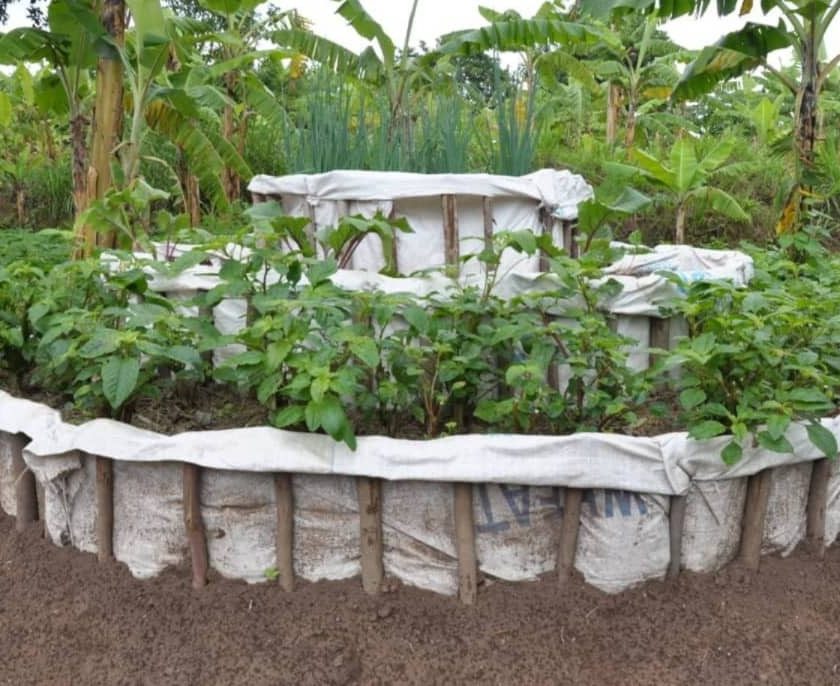By Diane NIKUZE NKUSI
Genetically modified crops known as GMOs could increase agriculture production, address pests and diseases that attack crops and scientists have assured that they don’t pose threats to human health.
GMOs are products of Agricultural biotechnology-an area of agricultural science involving the use of scientific tools and techniques, including genetic engineering, molecular markers, molecular diagnostics, vaccines, and tissue culture, to modify living organisms namely plants, animals, and microorganisms.
Dr Athanase Nduwumuremyi, Coordinator of Roots and Tubers Program at Rwanda Agriculture and Animal Resources Development Board (RAB) who is also the coordinator of the OFAB Rwanda chapter told umuringanews that GM crops are nedded considering that crops yields are still low per hectare compared to yield potential and that the diseases and pests attack major crops such as banana, cassava, Irish potatoes, and maize among other priority crops in Rwanda.
Banana crops are attacked by the disease, locally known as ‘Kirabiranya’.
Cassava crops are attacked by two deadly diseases.
These include Cassava Brown Streak Disease (CBSD) and Cassava Mosaic Disease (CMD).
The diseases have since 2014/15 affected cassava productivity, hence threatening the incomes and food security of many people in the country.
Irish potatoes are affected by deadly diseases dubbed “Potato Bacterial Wilt (PBW) Disease” and late blight disease.
Maize crop is affected by stem borer pests and armyworms among other diseases.
In addition to the issue of crop diseases, pests, and lower yields ,farmers are frustrated by the high cost of agrochemicals.
Statistics show that currently, farmers harvest between eight and ten tons of cassava per hectare yet they should be harvesting between 30 tons and 40 tons per hectare.
Maize production per hectare in Africa is 40 percent below that in developed countries
Statistics from Rwanda Agricultural and Animal Resources Development Board (RAB) indicates that potato farmers harvest an average of 16 tons per hectare yet they should be harvesting above 30 tons
It is in this context that Dr Nduwumuremyi said that GM crops are needed to boost food security by fighting diseases , pests and increase crop yields per hectare.
Today, more than 17 million farmers are planting GM crops in 29 countries and are reaping higher yields with reduced use of pesticides and better management of weeds among other benefits according to Food and Agriculture Organization (FAO).
“ So far there has been no victim of GM crops. They are really needed to address food insecurity,” he said while speaking to journalists on October 8, 2022 after training journalists on agriculture biotechnology reporting.
The training organized by OFAB Rwanda from October 7 to October 9, 2022 took place in Musanze district.
OFAB is a partnership platform in Africa that contributes to creation of an enabling environment for biotechnology research, development, and deployment for the benefit of smallholder farmers in Africa.
Established by African Agricultural Technology Foundation in 2006 as a platform for stakeholder interactions on agriculture biotechnology, OFAB is in seven other countries including Burkina Faso, Ethiopia, Ghana, Kenya, Nigeria, Uganda and Tanzania.
The Rwanda OFAB chapter is hosted by Rwanda Agriculture and Animal Resources Development Board (RAB).
How agricultural biotechnology is being used in Rwanda
Dr Nduwumurenyi said that so far Rwanda agricultural biotechnology is being used in plant disease diagnostics, mass propagation of clean planting material through tissue culture technique, production of Rhizobia, biological control, animal biotechnology crop improvement ( High yielding and more nutritious Resistant to pest and diseases) as well as medicine and investigation.
He said agricultural biotechnology is needed to increase food security and better Nutrition needed for a growing population.
“Biotechnology improves harvest per acre, increase yield, ensuring greater access to food, strengthening crops against extreme temperatures, drought, poor soil conditions, pest and diseases, and weeds. Biotechnology offers solutions for reversing malnutrition,” he explained.
Trials for GM crops in Rwanda
In Rwanda, he said, by using agricultural biotechnology, they are carrying out confined field trials for GM cassava that are resistant to deadly diseases.
Cassava is ranked second in terms of production after Banana
Cassava crop is one of 7 priority crops besides Banana, Cassava, Maize, Rice, Wheat, Irish Potato, Beans for food security in the country.
He said cassava yield declined from 13.5 to 8.7 tonnes/ha since 2013 to 2017 due to deadly diseases.
According to Pacifique Nshimyimana, Open Forum on Agricultural Biotechnology (OFAB Rwanda) Secretary, there are many outstanding benefits of GMO in farming.
He cited example where farmers in South Africa has access to GMO Maize since 1994 with varieties ranging from fall army-worm resistant BT Maize to drought-tolerant TELA Maize.
He said that thanks to agricultural biotechnology ,South Africa use small land for production and still beat Nigeria that produces on huge land acrage.
Globally, GM crops have reduced pesticide spraying (1996-2011) by nine percent.
In Bangladesh, BT-eggplant, an insect-resistant GMO eggplant has helped farmers to only 2 or zero spray per production from 12.
In Nigeria, the adoption of BT Cowpea reduced 70 percent cost of spraying pesticides.






